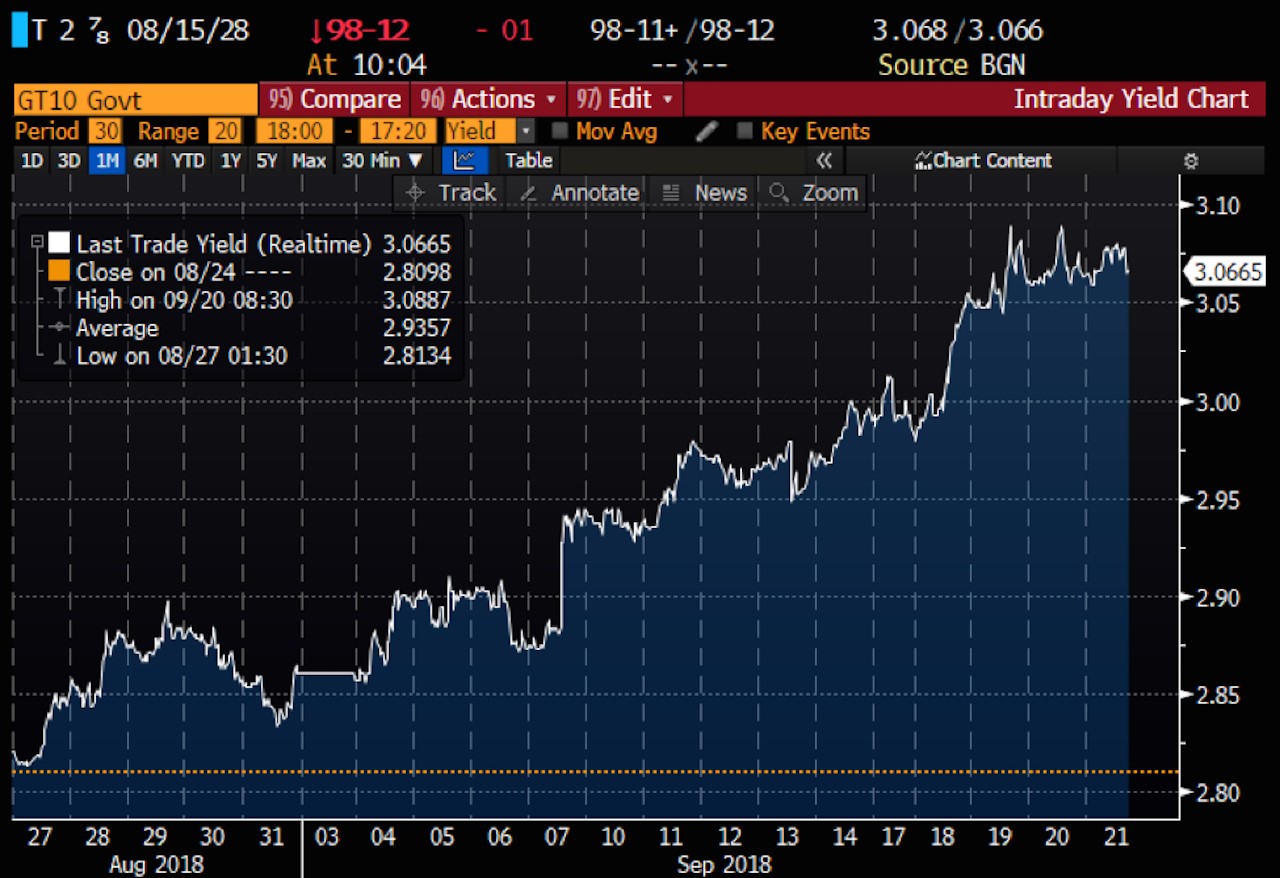Rates set to rise as equities hit new all-time high
Despite escalating talk on tariffs, the Dow Jones Industrial and S&P 500 both hit all-time highs this week, sending bond yields higher as part of a month-long trend.
By Friday mid-morning, the Dow had topped 26,700 points, pushing the all-time mark higher after first hitting a new record on Thursday. This was the first new all-time high since January.
The latest improvement can be attributed to receding fears of a trade war. More tough talk on tariffs this week suggested to many investors that tariffs may be less harmful than originally thought, especially as the Trump Administration seemed to out-leverage China in the latest spat.
The Trump administration announced on Monday it would impose a 10 percent tariff on $200 billion worth of Chinese imports, which would rise to 25 percent by year-end. China retaliated Tuesday by announcing levies targeting over 5,000 American products worth $60 billion and to go into effect next week.
Many analysts now expect a deal between China and the U.S. may be on the table in the months ahead.
Meanwhile, continued economic expansion prompted investors to sell off bonds, which drove yields higher. The 10 Year Treasury, which is closely followed by mortgage rates, headed toward 3.1 percent, punctuating a month-long trend. We need to watch this carefully as the bond markets are approaching some technical trading levels that could push the 10 Year Treasury to 3.25 percent. Rising mortgage rates, with volatility mixed in, remains the forecast.

This bond yield increase is happening for the following reasons:
- Investors believe economic growth here and abroad is real. They're buying equities because of real economic growth – not just inflation – and stabilization in emerging markets abroad.
- Tariffs. While some analysts have predicted intensifying tariffs and trade wars between the U.S. and other developed economies will drive inflation higher, recent evidence shows it only has attributed about 6 bps to the move.
- The Fed is closing in on another rate hike, and many investors believe they will increase rates twice by the end of the year. They also believe the long-term dot-plot map of projected rate hikes will increase. This would put a higher floor on interest rates.
- Some of the move is also just tactical. The market had too much supply in 10 and 30-year Treasurys last week and needed to sell (don't forget the Fed is selling Treasurys at a higher rate right now to support federal spending). Plus, corporate bond supply has been heavy, which weighs on rates. At the same time, large pensions funds have less appetite for bonds because of some tax policy change that expired last week. As a result they moved more funds into equities.
Housing and tariffs
Existing home sales for August were unchanged at 5.34 million, according to the monthly report released this week. This followed four months of declines, giving investors some optimism about the housing market. Home sales have been under stress due to several headwinds, including limited supply, higher costs and increased mortgage rates.
The National Association of Homebuilders this week came out with strong statements against President Trump's trade policies. They claimed the latest round of planned tariffs on Chinese goods would increase housing costs and hurt affordability.
NAHB estimates 600 products, representing $10 billion in goods, in the latest list of products to face tariffs are related to the construction of new apartments and homes.

Trump is proposing a 10 percent tariff on $200 billion in Chinese goods, effective Sept. 24., with that rate to increase to 25 percent in January.
"President Trump's decision to impose 10 percent tariffs on $200 billion worth of Chinese imports, including $10 billion of goods used by the residential construction sector, could have major ramifications for the housing industry," NAHB Chairman Randy Noel said in a statement. "With housing costs on the rise, this action translates into a tax increase on housing… Further, this tax increase is coming on top of the current 20 percent tariffs on softwood lumber imports from Canada. The lumber tariffs have already added thousands of dollars to the price of a typical single-family home."
Hurricane Florence
Finally, we're beginning to understand the economic impact of Hurricane Florence, which brought so much destruction to the Carolinas.
Property damage and disruption from Hurricane Florence is expected to total $22 billion, according to a Moody's estimate released this week. As flood damage continues to be uncovered, the total could rise.
Moody's said Florence is among the 10 costliest hurricanes on record in the U.S.
While the damage and recovery is expected to have a minimal impact on national GDP, the lasting effects will be felt in the Carolinas for years. The amount of rebuilding is massive and labor shortages in construction already will likely slow some of the recovery.
Please keep our friends and neighbors who are recovering in your thoughts and prayers. It will be a long road for many communities.


